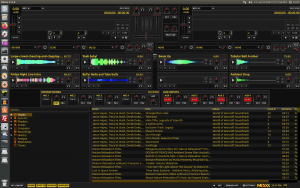The search for Xanadu
After spending countless hours scouring the web for free (Open Source) options for streaming audio, I narrowed my search down to two or three packages that would provide me the ability to broadcast my music to the internet. I played with them for hours, and then played some more. Poked and peek’d and prodded and got frustrated as I wasn’t any closer to my goal.
I remember finding obscure packages which were difficult to configure, difficult to get documentation and simply made me angry that it wasn’t working. I think it was two weeks of tests, and failures and I began to get discouraged. Surely someone has something out there to do what I wanted, so why was this so damned hard? Lots of streaming services out there, and companies like Pandora existed so I was certain there was someone who released a FOSS (Free Open Source) software package for being an internet radio station.
I kept finding services which charged a monthly fee to have a radio station on their server, and ASCAP fees and licenses and all that baloney. I did not want to make money with this, just be able to listen to my music anywhere I was, anytime I wanted and have full control of the playlist and maybe do some live broadcasting once in a while. Was that too much to ask?
No, it wasn’t too much to ask – and one weekend night, I finally discovered Xanadu! I read with eager eyes how a guy was streaming his music to a ShoutCast server he was hosting on an AWS server for like $20 a month hosting fee. And his station was listed in the ShoutCast directory with like a bazillion listeners! He had what I wanted, but how do I do that?
There’s a light! Over At The Frankenstein place…
I began to study Shoutcast and getting it running on a server on AWS Linux, and then how to create a radio station listing for Hawkwynd Radio in the Shoutcast Directory. I stood on the shoulders of greatness and could at last see the horizon ahead! I can’t tell you how excited I was. My wife thought me mad with fever, and probably just thought I was going through a phase in life. (3 months sober).
I already had an Amazon Web services account, and a small instance running some shared hosts for websites I’ve built. A modest fee for hosting it, which I justified because 3 of the sites were paid for by their clients which offset the cost of the hosting fee, which I felt, was a wash and no cost to me. Fair enough.
I logged into the AWS EC-2 console and created a small instance (nano) for running the ShoutCast software. With no trouble at all I had the instance running and shelled in to get things configured. Following the instructions, I set up the server and got it running.
I installed a simple program I found for my macBook and loaded up an mp3 file. I set the url to send the music to the streaming server. Then, I connected to the Shoutcast Server Admin web page, and saw the magic happen!
It was getting the stream! I did it!
I connected my headphones to the computer and listened to the sweet music over the web. For the first time I was broadcasting to the internet!
Alexander Graham Bell moment
I texted my friend JDub (John in Laverge) and sent him the link to the stream, asking him to see if he too could hear the music. After a few moments he texted me that he could hear the music! It was working!! I danced about the garage like a little kid on Christmas morning who discovered Santa Claus brought the dream present he was asking for that year!
So, now I knew it can be done, so I said “let’s find something with a little more options that I can get working in an automated fashion to play many songs, not just a single song”.
MIXXX – The perfect broadcaster’s tool
MIXXX is a free open source DJ software, readily available for Ubuntu and many other operating systems. It has many features and power tools to provide a DJ with almost everything he needs to be a live DJ.
I instantly fell in love with this software, and spent some time learning about how to do all the wondrous things it does. At this writing I am running version 2.2.4 and the user’s manual is here.
MIXXX is available for Linux, Windows and Mac computers. It’s open source, (free) and has excellent documentation. It is this writer’s choice of DJ software and I will be writing more about it’s use in future publications.
For now, if you want to just learn how to play with MIXXX, simply download it and get started.

